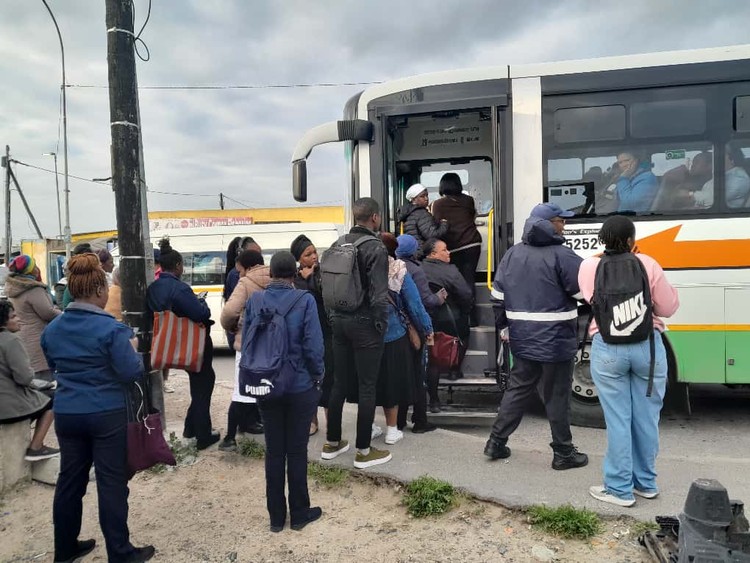
17 September 2025
Commuters in Makhaza pile into a full bus headed for Somerset Mall. Photo: Vincent Lali
Hundreds of people had their daily commute from Khayelitsha to Somerset West disrupted on Wednesday as a 30-day suspension of taxi routes came into effect.
The Western Cape Mobility Department decided to suspend ten routes by invoking Section 91 of the National Land Transport Act, amid escalating violence between warring taxi associations, the Cape Organisation for the Democratic Taxi Association (CODETA) and the Cape Amalgamated Taxi Association (CATA).
Eight people have been killed: six were killed in incidents between 23 and 26 August; a taxi boss, who was also a SAPS officer, was killed in Somerset West on 4 September; and another taxi boss was killed in Browns Farm on Tuesday.
Routes and some taxi ranks were closely monitored by police and law enforcement officers. Operators who defy the suspension face fines of up to R5,000 or six months in prison. At least six taxis were impounded on Wednesday for breaking the rules.
The Western Cape government has advised commuters to use either buses or trains. But there is no direct train line from Khayelitsha to Somerset West. Commuters would have to go to Bellville first to get onto the Northern Line to Somerset West. Golden Arrow Bus Services has made more buses available on its Somerset West route.
Workers and learners trying to get to Somerset West on Wednesday told GroundUp they had to wait at bus stops far from their usual pick-up points, with some waiting for hours to get to work or school. Others stayed home out of fear that taxi violence could erupt again.
Noluthando Tonjeni, who works in Somerset West, said buses arrived late and were mostly full. A two-hours wait for a bus made her late for work on Wednesday morning.
“Because this was the first day, I asked my two children, who also attend school in Somerset West, not to go to school because I did not know what to expect. They will remain at home until I am satisfied that the situation is calm,” she said.
Another commuter, Masibongwe Thembeni, said he worried the suspension could drag on beyond 30 days.
“When these two taxi associations fight over routes, the victims are commuters. I am late for work because no direct trains are going to Somerset West,” he said.
Law enforcement officers were stationed at several taxi ranks to ensure routes to Somerset West were not operating. Photo: Sandiso Phaliso
Zuki Nkola, who sells food near Nomzamo Taxi Rank, said that without her taxi driver customers she fears she won’t be able to pay for school transport, food or contribute to her stokvel at month-end.
Mamngwevu Bhekameva, who sells muffins and vetkoek, also said she had no customers. “My food is still here because the commuters are not available to buy them … I want the taxi drivers to resolve their differences and forgive each other.”
The mobility department said in a statement: “We cannot allow our communities to be held hostage by ongoing violence in the taxi industry. Violence will never deliver the results you seek. Only through negotiations and agreement can this industry find lasting stability.”
CODETA spokesperson Nceba Enge said the conflict with CATA was caused by the department’s “failure” to issue proper permits. CODETA holds the permit to operate on route 611 from Khayelitsha to Somerset West, but CATA continues to transport passengers on the same corridor illegally, he claimed.
CATA had not responded to GroundUp at the time of publication.
The mobility department was asked to comment on CODETA’s claims, but responded only with a media statement, which did not answer our questions.
A meeting planned for Tuesday evening between the department, CODETA and CATA was cancelled at short notice. Enge said CODETA was not informed of the reasons for the cancellation.